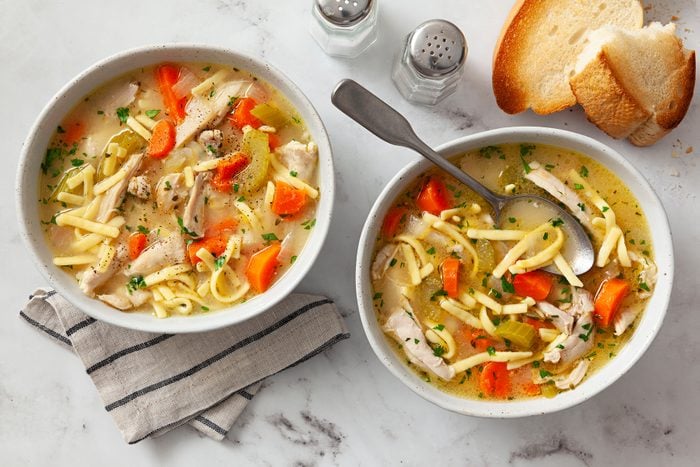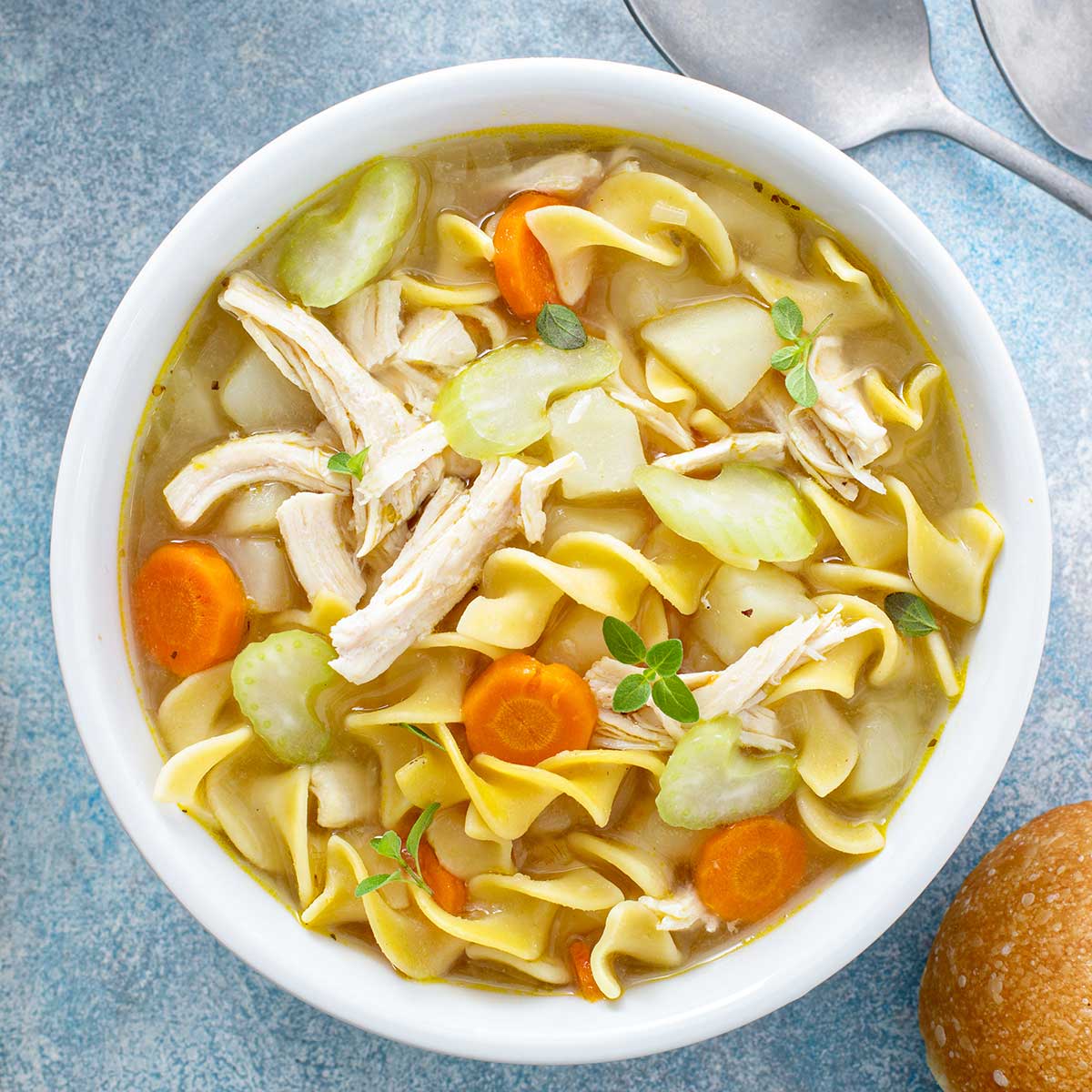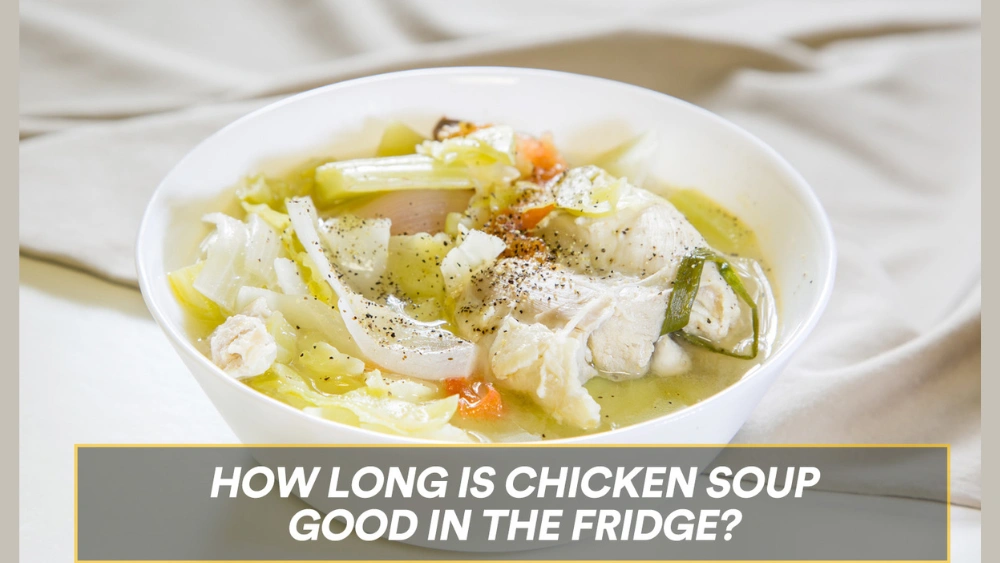You’ve just made a big pot of homemade chicken soup, and it smells amazing. But now, you’re wondering—how long can your delicious soup safely stay fresh in the fridge?
Eating spoiled soup can ruin your day and upset your stomach, so knowing the right storage time is key. You’ll discover exactly how long your homemade chicken soup lasts, the best ways to store it, and tips to keep it tasting great.
Keep reading to make sure every spoonful is safe and satisfying.

Credit: www.tasteofhome.com
Shelf Life Of Homemade Chicken Soup
Understanding the shelf life of homemade chicken soup is key to enjoying your meal safely and avoiding waste. Unlike store-bought soups, homemade versions don’t contain preservatives, so they tend to spoil faster. Knowing how long your soup lasts in the fridge helps you plan your meals better and keep your family safe from foodborne illnesses.
Typically, homemade chicken soup can last in the fridge for about 3 to 4 days. This timeframe assumes the soup has been cooled quickly and stored in a clean, airtight container. If you notice any off smell, change in color, or slimy texture, it’s best to discard it immediately.
How Storage Conditions Affect Soup Freshness
Keeping your chicken soup in the coldest part of the fridge, usually near the back, can extend its freshness. Leaving it uncovered or in a warm spot can shorten its shelf life dramatically. Always use containers with tight lids to prevent exposure to air and bacteria.
Signs Your Homemade Chicken Soup Has Gone Bad
- Smell:Sour or unusual odors are a clear warning.
- Appearance:Cloudiness, mold spots, or a change in color mean spoilage.
- Texture:Slime or excessive separation often indicates bacteria growth.
Have you ever noticed your soup smelling off after just a day? That’s a sign you might need to improve your cooling and storage routine.
Tips To Extend The Shelf Life Safely
- Cool the soup quickly by placing the pot in an ice bath before refrigerating.
- Divide the soup into smaller containers to help it chill faster and more evenly.
- Reheat only the portion you plan to eat to avoid repeated temperature changes.
Following these steps can help you stretch the life of your soup without risking safety.
Signs Of Spoiled Chicken Soup
Knowing the signs of spoiled chicken soup helps keep you safe and healthy. Spoiled soup can cause stomach upset or worse. Trust your senses and check carefully before eating.
Unpleasant Smell
Spoiled chicken soup often has a sour or rotten smell. Fresh soup smells warm and savory. A bad odor signals bacteria or mold growth. Do not taste soup that smells off.
Change In Color
Look for cloudy or dull colors in the soup. Fresh chicken soup usually looks clear or slightly yellow. Any green, gray, or strange tint means it may be spoiled. Discard soup with unusual colors.
Texture And Consistency
Thick, slimy, or sticky texture is a bad sign. Fresh soup should have smooth broth and tender chicken pieces. Clumps or a film on top show bacteria growth. Avoid eating soup with altered texture.
Visible Mold
Mold can appear as white, green, or black spots. Mold often grows on the surface of the soup. Never scrape off mold and eat the rest. Throw the entire container away immediately.
Off Taste
If you taste the soup and it is sour or bitter, spit it out. Spoiled soup tastes very different from fresh. Even a small amount of bad taste means it’s unsafe. Stop eating right away.
Proper Storage Techniques
Proper storage techniques keep homemade chicken soup fresh and safe to eat. Storing soup the right way slows bacterial growth. It also preserves flavor and texture. Follow these steps to store chicken soup correctly after cooking.
Cooling Soup Quickly
Cooling soup fast stops harmful bacteria from growing. Pour hot soup into smaller containers. Leave some space at the top. Place containers in the fridge uncovered for 30 minutes. This helps steam escape and soup cool down. After that, cover the containers tightly.
Using Airtight Containers
Airtight containers keep soup fresh longer. They stop air and moisture from entering. Use glass or BPA-free plastic containers with tight lids. Label containers with the date you cooked the soup. This helps track how long the soup stays good.
Ideal Fridge Temperature
Keep your fridge between 34°F and 40°F (1°C to 4°C). This temperature slows bacteria growth. Use a fridge thermometer to check the temperature. Avoid overcrowding the fridge. Cold air must circulate around containers for even cooling.
Freezing Chicken Soup
Freezing chicken soup is a smart way to extend its shelf life and enjoy your homemade comfort food later. It locks in flavors and nutrients, saving you time on busy days. But to keep your soup tasting fresh, you need to freeze it the right way.
Freezing Duration
Chicken soup can last in the freezer for up to 4 to 6 months without losing quality. After this period, the taste and texture may start to decline, although it will still be safe to eat if kept frozen continuously.
Think about how often you want to enjoy your soup. Freezing in smaller portions helps you use only what you need, reducing waste and keeping the rest fresh.
Best Containers For Freezing
Choosing the right container makes a big difference in preserving your soup’s flavor and preventing freezer burn.
- Freezer-safe plastic containers:These are great because they seal tightly and come in various sizes.
- Glass jars:Use only jars labeled freezer-safe and leave space at the top for expansion.
- Heavy-duty freezer bags:They save space and are perfect for flat freezing, which speeds up thawing.
Label each container with the date you froze the soup. It helps you track freshness and decide when to eat it.
Thawing Methods
How you thaw your chicken soup affects its taste and safety. The best way is to thaw it slowly in the fridge overnight. This keeps the soup at a safe temperature and preserves its texture.
If you’re in a hurry, place the sealed container in cold water, changing the water every 30 minutes. Avoid thawing at room temperature to reduce the risk of bacteria growth.
Once thawed, heat the soup thoroughly until it’s steaming hot before eating. Have you tried reheating frozen soup in a slow cooker? It’s an easy way to bring back that freshly made taste without much effort.
Reheating Tips For Safety And Flavor
Reheating homemade chicken soup properly is key to keeping it safe and tasty. You want to avoid underheating, which can leave harmful bacteria alive, or overheating, which can turn your soup into a bland, watery mess. Let’s dive into some simple tips that keep your soup delicious and safe to enjoy again.
Heat Soup Evenly To Kill Bacteria
Stir the soup frequently as it reheats. This helps distribute the heat evenly so no cold spots harbor bacteria. Use a food thermometer to check that the temperature reaches at least 165°F (74°C) before serving.
Reheat Only What You Plan To Eat
Repeatedly reheating the entire pot can spoil the flavor and texture. Instead, heat small portions each time. This keeps the soup fresh longer and reduces the risk of contamination.
Use The Right Reheating Methods
- Stovetop:Warm over medium heat with a lid to trap steam and retain moisture.
- Microwave:Cover with a microwave-safe lid or wrap and stir halfway through heating.
- Slow Cooker:Set on low to gently reheat large batches without overcooking.
Enhance Flavor When Reheating
Sometimes reheated soup can taste dull. Add a splash of fresh lemon juice, a pinch of fresh herbs, or a dash of salt after reheating. These simple touches revive the flavors without extra effort.
Have you ever reheated soup only to find it bland or unevenly warm? Try these tips next time to enjoy your homemade chicken soup just like the first time you made it.

Credit: www.laurafuentes.com
Common Mistakes To Avoid
Keeping homemade chicken soup fresh in the fridge needs care. Many make simple mistakes that spoil the soup faster. Avoiding these errors helps the soup stay tasty and safe to eat longer.
Storing Soup While Still Hot
Putting hot soup directly into the fridge raises the temperature inside. This can cause other foods to spoil faster. Cool the soup to room temperature before refrigerating. Use an ice bath or divide into smaller containers to speed cooling.
Using Improper Containers
Plastic containers that are not airtight let air in. Air exposure causes the soup to go bad quickly. Use clean, airtight containers made for storing food. Glass jars with tight lids work well too.
Leaving Soup In The Fridge Too Long
Chicken soup should not stay in the fridge for more than 3 to 4 days. Eating old soup risks food poisoning. Label your containers with the date you made the soup. This helps track freshness easily.
Reheating Soup More Than Once
Reheating soup repeatedly increases bacteria growth. Heat only the portion you plan to eat. Avoid cooling and reheating the same soup multiple times.
Not Checking For Signs Of Spoilage
Always smell and look at the soup before eating. Sour smell, strange color, or mold means the soup is bad. Toss it out immediately to avoid illness.
Extending Freshness With Ingredients
Extending the freshness of homemade chicken soup depends a lot on the ingredients used. Some ingredients help keep the soup fresh longer. Others might make it spoil faster. Choosing the right ingredients can stretch the time your soup stays good in the fridge.
Fresh vegetables like carrots and celery add flavor without spoiling quickly. Herbs such as thyme or parsley keep the taste lively and fresh. Avoid adding dairy or cream to the soup if you want it to last longer. These can cause the soup to go bad sooner.
Using quality chicken and properly cooking it also helps. Proper cooking kills bacteria that cause spoilage. Storing the soup in airtight containers slows down the loss of freshness. Cooling the soup quickly before refrigeration is important too.
Choosing Vegetables That Last Longer
Root vegetables like carrots, potatoes, and parsnips hold up well in soup. They keep their texture and flavor over several days. Leafy greens spoil faster and should be added just before eating.
Herbs That Preserve Flavor
Hardy herbs such as thyme and rosemary keep their taste longer in soup. Delicate herbs like basil lose flavor quickly and turn brown. Adding herbs at the right time helps maintain freshness and aroma.
Proteins That Stay Fresh
Cook chicken fully to reduce bacteria growth. Use fresh chicken rather than leftovers for longer shelf life. Avoid adding seafood or dairy proteins if you want the soup to last more days.
Storage Tips To Keep Ingredients Fresh
- Cool soup quickly before refrigerating.
- Store in airtight containers to prevent air exposure.
- Keep soup at the back of the fridge where it’s coldest.
- Reheat only the amount you will eat to avoid repeated cooling.

Credit: www.homemademastery.com
Frequently Asked Questions
How Long Does Homemade Chicken Soup Last In The Fridge?
Homemade chicken soup typically lasts 3 to 4 days in the fridge. Store it in an airtight container at or below 40°F (4°C). Always check for signs of spoilage before consuming to ensure safety.
Can I Freeze Homemade Chicken Soup For Later Use?
Yes, homemade chicken soup freezes well for up to 4 months. Use freezer-safe containers and leave space for expansion. Thaw in the fridge overnight before reheating thoroughly to enjoy the best taste and texture.
What Are Signs That Chicken Soup Has Gone Bad?
Spoiled chicken soup may smell sour or off, have a slimy texture, or show mold growth. If you notice any of these signs, discard the soup immediately to avoid foodborne illness.
How Should I Store Homemade Chicken Soup In The Fridge?
Store chicken soup in a clean, airtight container in the fridge. Let it cool to room temperature before refrigerating to prevent bacterial growth. Consume within 3 to 4 days for optimal freshness and safety.
Conclusion
Homemade chicken soup stays fresh in the fridge for about 3 to 4 days. Always store it in a clean, airtight container to keep it safe. Check the soup for any strange smell or change in color before eating. Reheat the soup until it’s hot all the way through.
Eating soup past its safe time can cause illness. Proper storage helps you enjoy your soup without worry. Keep these tips in mind to enjoy your homemade chicken soup safely. Simple steps make a big difference in food safety.

